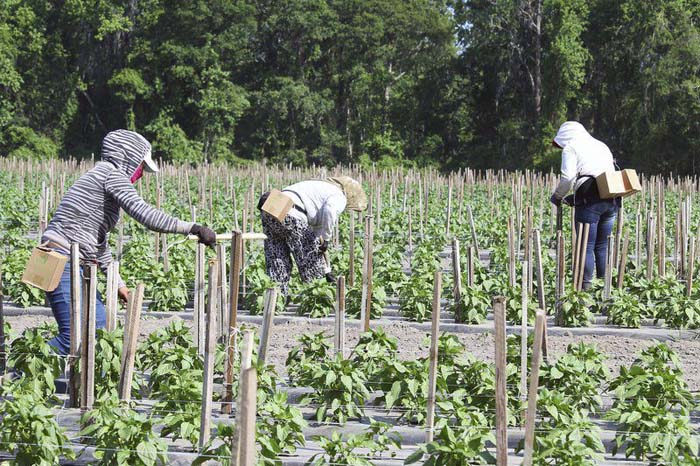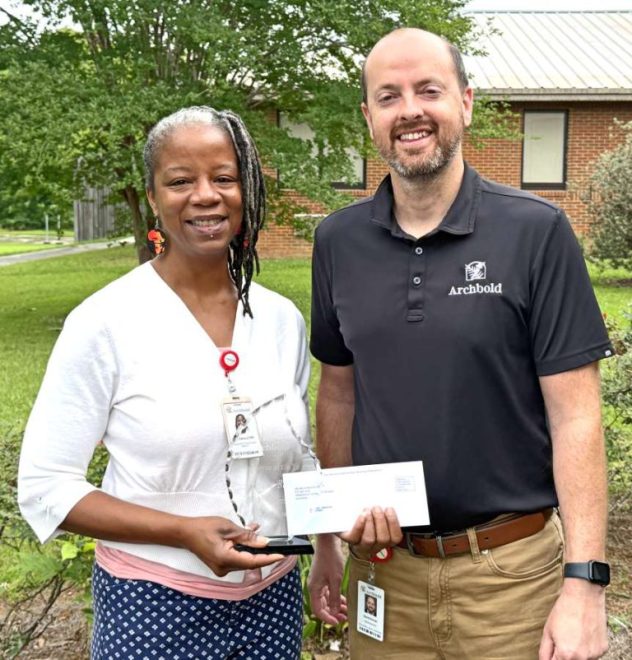Coming to America: Economic impact of documented, undocumented workforce
Published 2:00 am Sunday, May 7, 2017

- Derrek Vaughn | TheValdosta Daily Times Migrant workers are seen in a Lowndes County field.
VALDOSTA — Francisco Perez was harvesting coffee beans in Chiapas, Mexico. He heard stories from friends about making the trek from the Southern Mexican state all the way to North Florida and Georgia to work in the fields.
The 21-year-old knew the work would not be easy. The stories he heard were about long, tireless days of hard labor under the hot sun.
Trending
Even knowing what he was in for, Perez said making the journey was worth it. Coming to the United States was a chance to help his family.
“I think many people came here for the same reason as I did – out of necessity,” Perez said. “They need resources to help their family.”
He works on a farm in Lowndes County, cutting onions during the day and filling up buckets, earning 45 cents for each bucket. Then he returns to his housing quarters at 8 p.m., just in time to go to bed and get a few hours of sleep before facing the next long day of work.
“It’s a little more difficult than work in Mexico,” he said. “We’re happy to be here because not everyone gets the chance. You have to appreciate the opportunity. We’re used to working in the fields. We’re here for a short period of time. And we just work. What else can we ask for?”
In the SunLight Project coverage area — Live Oak, Jasper and Mayo, Fla., and Dalton, Valdosta, Thomasville, Tifton, Milledgeville and Moultrie, Ga., along with the surrounding counties — agriculture is a driving economic force. Both legal and illegal immigrants constitute a large part of the labor force pushing this economy forward.
Shifting immigration policies, more aggressive deportation by the feds and talk of building a border wall concern many people in the agricultural community and other industries but many conservatives do not share those concerns.
Trending
Immigrant and Employer Perspective
It’s not a secret that there are loads of agricultural jobs available in Georgia and Florida — hundreds, if not thousands, all of which pay above minimum-wage with the potential to earn nearly three or four times that amount.
So why are few people bothering to apply for the jobs?
The jobs aren’t easy.
Some say working in the fields requires superhuman stamina, hours in the hot sun, harvesting fruits and vegetables, then packing them for shipment.
The people who manage the operations said local residents won’t do the jobs, even for a minimum wage that can be more than $10 and increases based on productivity.
Changes in immigration policy impact the agricultural industry.
Take 2012. Fruit and vegetable growers lost up to $140 million from the previous year after new immigration policies went into effect. State officials sent prison parolees out to the fields. The men needed work because of how difficult it can be to find a job with a felony conviction, but few lasted even a few days. Many bailed out after the first morning or at the end of the first day.
The immigrant workers, most of whom are Hispanic, bear with the long hours and harsh living conditions in search of economic opportunities.
Colquitt County vegetable grower Heath Wetherington of H&W Farms near Norman Park remembers one local worker leaving the fields after working long enough to earn a whopping partial-hour wage of $4.
While there’s a potential $1 million worth of produce waiting to be harvested and shipped, it’s worthless without a dependable labor force, he said.
“There’s not enough local Americans (willing to do the work) to feed America,” Wetherington said. “If we had every single one of them without a job out there, we couldn’t feed America. If they have the experience required in the ad, we do hire them; we do give them a chance.”
During the previous five years, he has had about 40 local applicants. Out of the 20 who had the required experience, five showed up to work the first day.
“We’ve had one local (worker) over the last 18 years to work more than a month or two — a whole season — over 18 or 19 years out of 400 applicants,” Wetherington said.
Since 1999, H&W Farms has used the federal H-2A Guestworker program to staff its operation, with the exception of one year when he tried working outside of the system.
“One year, we tried to get away from H-2A and just depend on local migrants moving through,” he said. “It didn’t work.”
Shelly Zorn, Thomasville Payroll Development Authority executive director, said many industries, farms and businesses in the region and nationwide use an immigrant population.
“It would be devastating to our local and national economy to remove all those individuals from our workforce. Many businesses and farms would shut down without those workers,” she said.
Immigrants who come to the U.S. are looking for opportunity, not a handout, said Luz Cooper, who arrived in Ellenton, Ga., from Mexico in 1999 on an H-2A visa.
“I know these people and they’re hard workers,” said Cooper, now a naturalized U.S. citizen who worked at an Ellenton health clinic. The clients at the clinic included a lot of farmworkers. “They provide a lot in this economy, in this county. Sometimes the whole families are in the fields.”
Even if undocumented, they are working to feed their families, she said, and endure “demeaning” legal challenges, such as laws that prohibit them from acquiring a driver’s license.
“I came from a poor family in Mexico,” she said. “I just wanted to help them out, buy my mama a house.”
With a nine-month visa, her work at Larry Booth Farms included picking squash, eggplant, greens, collards, mustards, cucumbers and turnips.
“I worked through the rain, through the cold,” said Cooper, who is now married to a U.S.-born citizen. “It was hard work. I worked there for about six years.”
Valdosta resident Tony Marin said misconception and misinformation abound when it comes to immigrants. Marin is a Florida State University researcher who has been working with the country’s Latino population for decades.
He is Venezuelan, attended college in the U.S., then moved here permanently in the 1990s with his American-born wife and two children.
He said immigrants, even illegal ones, don’t drain America’s economy like many believe but actually contribute to it by paying taxes on everything they buy in local communities — groceries, gas, clothes, cars, etc.
Many undocumented workers also pay federal taxes through individual tax identification numbers, which are issued by the Internal Revenue Service to workers who are not eligible to receive a Social Security number.
In fact, “various studies have estimated between 50 and 75 percent of undocumented immigrants currently pay personal income taxes using either false Social Security or ITIN numbers,” the Institute on Taxation and Economic Policy reported.
“Economically, we know (immigrants) are at least half of the population of Dalton, so that is all you really need to know about their economic impact,” said Rob Bradham, president and CEO of the Greater Dalton Chamber of Commerce. “Right now, the Hispanic community is driving the vast majority of the entrepreneurship in the area. If the immigrant population were removed, entrepreneurship would decrease significantly. That business community is extremely important from an entrepreneur standpoint.
“It would be horrible. Immigrants working in our local industries are essential workers. There is more money than people would estimate in our Hispanic community. And it is only going to grow.”
Thomas County Manager Mike Stephenson could not provide an estimate of sales taxes paid by immigrant/migrant residents.
“The state Department of Revenue does not give us a breakdown on the source of sales tax collected,” Stephenson said.
Merchants, he said, collect the tax and turn it over to the state.
And illegal immigrants aren’t taking advantage of government services either, Marin said, because there’s no way for them to.
“What services? It’s impossible,” he said. “You cannot get food stamps if you’re not a legal resident. You cannot get Medicare.”
Federal law prohibits disseminating statistics on how many patients are undocumented, said Jim Matney, CEO at Colquitt Regional Medical Center. The rate of unpaid medical care does not seem to be alarming, he said.
“My intuition is that these folks pay their bills,” Matney said.
Marin said the immigration workforce contributes greatly to the economy, and that without it, the country would “crash completely.”
National media focuses on illegal immigrants who are criminals, Zorn said.
“Of course, those issues need to be addressed, as do assistance programs,” she said, “but for the non-criminal, hard-working individuals in our country from other nations, my opinion is, if they have a job, let’s assist them in becoming legal, collect their tax dollars and realize how valuable their contribution is to our economy.”
Not Everyone Agrees
While numerous sources said they believe both documented and undocumented workers are doing jobs Americans will not do and foreign-born laborers are essential to the American economy, not everyone agrees.
Gary Wisenbaker is a political strategist and a conservative voice in South Georgia.
He worked on the campaign to elect President Donald Trump and writes popular conservative columns published by several media outlets, including The Valdosta Daily Times.
“While there may be some anecdotal evidence that immigrants are doing jobs Americans won’t do, there’s little hard evidence to back up that claim,” Wisenbaker said. “A recent Pew report, for example, found only five occupations where immigrants outnumbered U.S. workers. And a Census Bureau report that collected data from 2005-2007 from 465 civilian occupations found only four that were majority immigrant. That immigrants — undocumented or otherwise — are here because they’re doing jobs native workers won’t do is largely a myth.”
He agrees there is a farm labor shortage but suggested it may be more related to what he calls “the nature of the beast,” than a disinterested American worker.
“These jobs are seasonal and those working the fields only do so for a number of weeks before they have to move on. Most Americans are, quite simply, sedentary,” Wisenbaker said.
So, what is his solution?
Wisenbaker touted what he regards as a “common sense” guest worker permit policy possibly using special ingress/egress visas based on a demonstrable need. He said the approach could ensure U.S. workers are given top priority as well as meet the objective of getting the crops out of the field.
Under that kind of plan he suggested, “Farmers would be protected from random criminal or civil penalties for inadvertent violations of INS rules and regs and those that hold the permits would contribute with withholding taxes, U.S. workers would be protected, and our borders would be more secure.”
Farm, Business Dependency
Lowndes County Sheriff Ashley Paulk deals with immigrants in two contexts: as a law-enforcement official and as a farmer who owns 4,000 acres of pecan orchards in the area.
As a farmer, he pays subcontractors to hire men during harvest season and many of the workers are probably undocumented, Paulk said.
While many say immigrants are stealing jobs from natural-born Americans, Paulk disagrees. He said he also believes migrant workers fill jobs that Americans don’t want; without them, American farming would grind to a halt.
“If you shipped them all back, you could not find the American people who would take any of the jobs,” he said. “There is nobody coming by these farms, except Hispanics, looking for work.
“The farming industry would stop without immigrants.”
Paulk said he doesn’t think they are taking jobs from Americans.
“They could leave here and you would not see people swarming to take those jobs,” Paulk said. “They do a lot of hard work, a lot of dirty work. They’re very hard workers.”
The pay for such intense labor is actually decent, Paulk said. At his pecan orchards, workers get paid $10.50 per hour. Blackberry harvesters, on the other hand, get paid a certain amount for every plastic container they fill, so they could make $300 in a day, Paulk said.
David Young, owner of PDC Construction in Bainbridge, hires subcontractors who employ immigrant/migrant workers. He said the workers have expertise in masonry, carpentry, landscaping, construction site work, duct work and framing.
In a construction project at Thomas County School System administrative offices, about a third of workers were immigrant/migrant. Masons on the job make $20 to $22 an hour. Laborers are paid $8 to $12 an hour.
“It would be hard to find subcontractors doing wall and framing and masonry without migrants,” Young said. “It’s hard to find young Americans who want to learn these trades.”
He requires subcontractors to employ only immigrant/migrant workers who are in the United States legally. If not, Young will not hire them.
Young said he never had a problem with migrants getting into trouble with the law but he has with other employees. Fights have broken out among other employees, and drug odors have been detected.
“Never, never has it been from a migrant worker, ever,” he said.
Most businesses in Baldwin County were reluctant to admit they employ immigrants. Philip O’Connor, who has worked for several years as the head waiter at Kuroshima, a popular Japanese restaurant in Milledgeville that regularly hires immigrants from Mexico and Central America, was willing to talk about the subject.
The restaurant’s owners are immigrants, having settled in Milledgeville from Korea more than 25 years ago.
O’Connor said the number of immigrants Kuroshima has hired during the years equals “about two to three every two to three years. I can’t give an exact number but that’s close.
“Generally they’ll work in the back (washing dishes, cooking, etc.), but we have had a couple that helped out front (waiting tables),” O’Connor said. “It’s all dependent on their language skills. We as workers could communicate with them but the general customer base would not be able to unless they spoke English.”
He said the restaurant is “dependent on every worker but they are all replaceable. A point to make is that they make as much money as our American workers, and some immigrants will make more if they do a better job. The reason we use immigrants on work visas so much is because they are usually willing to work longer hours.”
He said their work ethic is comparable to native-born employees.
“We have some very good workers on both sides but also some very poor ones as well,” he said.
Law Enforcement Perspective
As Lowndes County sheriff, Paulk said he simply doesn’t see Hispanic immigrants as a problem in Lowndes, and rounding up illegal immigrants is not one of his top priorities.
Paulk made it clear that Lowndes County is not a sanctuary for illegal immigrants, but he said he’d rather go after active criminals rather than undocumented immigrants who make an honest living and don’t cause trouble.
“Do you want to concentrate on the criminals who are doing the shooting and everything else, or go out and try to get people out in the fields picking vegetables?” asked Paulk, who has more than 16 years of experience as sheriff.
“I’m not saying we’re a sanctuary but we’ve got more important things to do as far as cleaning up this county,” he said.
He said his office will serve any warrant the federal government puts out on illegal immigrants but he said he’s not going to feed into the stereotype that every Hispanic person he sees is here illegally.
“First of all, that’s illegal under federal law. There’s a lot of Hispanics here who are legal, so you start stopping every Hispanic, you’re profiling,” he said. “You’re going to get complaints and you’re going to get lawsuits.”
Suwannee County Sheriff Sam St. John said he doesn’t see more crime than what is typical among immigrant communities in Suwannee County. He said they can get called out to some migrant worker camps on the weekends for some drinking-related issues but there is little serious criminal activity.
As far as deporting immigrants in Suwannee County who are here illegally, St. John said there is little they can do.
“Immigration won’t come and get them, so there isn’t much we can do but cut them loose, unless they’ve committed some kind of crime,” St. John said.
He said the sheriff’s office has little authority in deporting individuals and the federal government won’t get involved with individual cases. The only time St. John can remember U.S. Immigration and Customs Enforcement coming to the county is 20 years ago.
ICE came with trucks and hauled a group of people away, he said. It seemed to St. John that ICE has limited resources to deal with every single immigrant and deals mostly in bulk.
Dalton Police Chief Jason Parker agrees; local departments are not too concerned with what they see as federal jurisdiction, and are not concerned about the effect of any executive orders that may be issued by the current administration.
“It won’t affect our day-to-day operations,” Parker said. “The key phrase in (Trump’s immigration executive orders) is ‘to the extent allowable by law.’ I don’t know of any local authorities who have that power. I don’t see that particular section having an impact here at the local level. We have had a sizable immigrant community for a while, and we think we have a very good relationship with that community.”
“We don’t track victims of crimes by race or ethnicity or the perpetrators on race or ethnicity,” said Dalton Police Department spokesman Bruce Frazier. “And even if we did, that wouldn’t quantify them as immigrants either since we have a high percentage of our population as native Hispanics.”
“Speaking anecdotally, our experience is that some members of the immigrant community would be hesitant to report a crime,” Frazier said. “There is a fear that any contact with law enforcement would lead to deportation or arrest, even though that simply isn’t the case. We suspect there is crime occurring that is not getting reported.”
The Whitfield County Sheriff’s Office participates in the 287(g) program with Immigration and Customs Enforcement. Anyone who comes into contact with the sheriff’s office under suspicion of a crime is run through the immigration database and can be detained.
“Everything is the same and nothing has changed from our perspective,” Whitfield County Sheriff Scott Chitwood said. “Local officers do not have federal authority with the exception of a few officers who work inside the jail who do have federal credentials. Can a regular street officer here go out and make a sweep of the street demanding to see someone’s papers? No. You have to have committed a violation against the laws of the state of Georgia and have already been detained for a jailable offense before we even get to anything to do with immigration status.”
“A lot of people live in fear of being deported and having their families torn apart,” said America Gruner, president of the Coalition of Latino Leaders in the Dalton area. “They go on with their daily lives and try to avoid any problems but they still live in fear. It is both federally and locally a concern since our sheriff and police have an agreement with immigration to have them arrested.
“We feel like we are going back to 2008 when hundreds of people were detained in Dalton,” Gruner said, referring to when the Whitfield County Sheriff’s Office became a 287(g) partner. “That is our main concern right now. That is going after the most people. People are distracted with many things happening at the same time. Most people focused on the wall, but not many people have read the fine print on the other things to do with immigration. Little by little, it isn’t the wall only, but many more things.”
Gruner said from 2008 to 2012 many families were split by enforcement of the partnership with ICE, but in 2012, President Barack Obama issued an executive order to basically give amnesty to immigrants who had lived in the country for more than 10 years, had no criminal background and had children born in the United States.
Now, because of efforts by the Trump administration, she said she fears that could change.
“Most people see us as a labor force but not as equals. There is still a huge wall between the Latino community and the rest of the area because there are small camps that want to stay in power and they don’t see Latinos as equals,” she said. “People always say why don’t they just become legal. It isn’t just a matter of filling out some paperwork. For most of the undocumented people here, there are no options for them to become ‘legal.’”
Obtaining legal status takes time, money and other resources that immigrants, especially if they are already here illegally or are migratory, cannot access.
It costs a minimum of $1,140 to get a green card, while the H-2A visa costs $460, officials said.
The process to become a naturalized citizen is lengthy, expensive and requires being able to travel substantial distances, which in turn necessitates the ability to take time off work and the ability to get to either Atlanta or Jacksonville, the two nearest U.S. Citizenship and Immigration Services offices.
The cost to apply for naturalization begins at $725, and that cost doesn’t take into account the cost of travel and other fees that may be applied. According to the USCIS web page, the time it takes to process applications varies, but they “would like to decrease the time it takes to an average of six months.”
By the Numbers
Georgia’s percentage of foreign-born residents grew from 2.7 percent in 1990 to 9.7 percent in 2013, when there were an estimated 979,979 immigrants, according to the American Immigration Council, and of those 38.7 percent were naturalized. Some 1 in 10 Georgians are either Latino or Asian.
The Pew Hispanic Center estimated that in 2012, 3.9 percent of the state population — or 400,000 people — consisted of unauthorized immigrants.
While county-specific numbers on the overall economic impact of undocumented immigrants is scarce, an American Immigration Council study indicated that in 2010 they paid $60 million in state and local taxes, including $265.5 million in sales taxes, $60.3 million in state income taxes and $34 million in property taxes.
Gruner said while it is difficult to know exact numbers, her “informed guess” would be that 35 to 40 percent of the immigrant population is undocumented.
Rob Bradham, president and CEO of the Greater Dalton Chamber of Commerce, said, “We think that number could be even higher. That is the number that is documented and willing to provide information. We think that is probably higher.”
Desperation and Survival
Tony Marin, the University of Florida researcher from Valdosta, said President Donald Trump’s rhetoric toward immigrants — mainly Hispanics — is inaccurate and insulting.
“He calls my people criminals and I am not a criminal. Some of us are but some white people are criminals, too, some black people are criminals, too. So why do you have to get elected insulting me and calling me names?” Marin asked.
Marin said regardless of the discrimination and negative stigmas many immigrants face in the U.S., people from other countries will continue traveling to America out of desperation.
“It doesn’t matter how many walls Mr. Trump or whoever builds. It can be a wall to the sky, but if there’s hunger in (other) countries, people are going to come,” he said.
“Immigration is only one word in my opinion. Survival. People come here because they have two choices: They let their children die in their country or they take the risk of dying or being discriminated against to (come) here where they can find work.
“If you have children and your children are hungry, you’re going to find a way to feed your children — even if you die.”





